2019教育牛津译林版7AUnit4GRAMMAR (共20张PPT)精品英语
合集下载
牛津译林版7A Unit4 Grammar (共31张PPT)
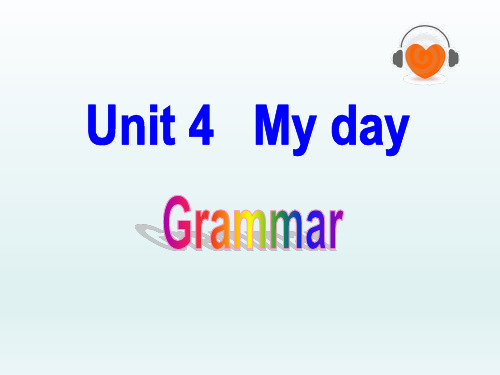
In summer.
我们谈论时间时, 何时用at / on /in ?
What about “in”
时间介词---in
用在: 1. 月_份__前__(m_ onths) 2. _年__份__前__(years) 3 季__节__前__(s_easons)
in October in 2012 in spring
1. days
We do not go to school on Saturday.
on
2. dates
Our summer holiday starts on 1 July.
3. parts of a
Amy goes swimming on Sunday morning.
specific day
Amy goes swimming on the morning of
34..IChbieldgraenntgoelteamrannEynpgrleisshe_na_tts_8_a._t(Cahgre)istm(faess.tivals) 5.I read English _in__ the morning.(parts of the day)
6.My sister was born __o_n_ 2nd October. (dates)
• 2. In America, it’s very cold in wint.er • 3. They’re going to the library on
the morning of October 3rd. • 4.ห้องสมุดไป่ตู้The teachers are going to have a
meeting on Friday aftern.oon 5. The birds are in the tree.
《 7AUnit4Grammar4 》 公开课精品课件

Millie and her father are talking about the food for dinner. Complete their conversation with the correct
forms of ‘there be’
Mr Wang: Wow,we have so many things for
o + s or es
shelf d
knife
shelves knives
f or fe -f or fe+ves
two dogs
two birds
four cats
two watches
three tomatoes
ten knives
Uncountable noun(不可数名词)
We can use the following structure(结构) to show(表示) their amounts(量)
countable nouns and uncountable nouns
(可 数 名 词) (不 可 数 名 词)
你能帮助下列单词找到他们自己的家吗? apple rice glass meat story mango coke sheep milk foot pork woman news water
• 3.Amy goes to the Swimming Club three times a week. Sheu_s_u_a_l_lyswims after school.
• 4.Daniel spends all his free time sitting in front of the computer. He_n_e_v_er_ plays football.
新牛津译林版七年级英语下册Unit4 Grammar精品课件.ppt
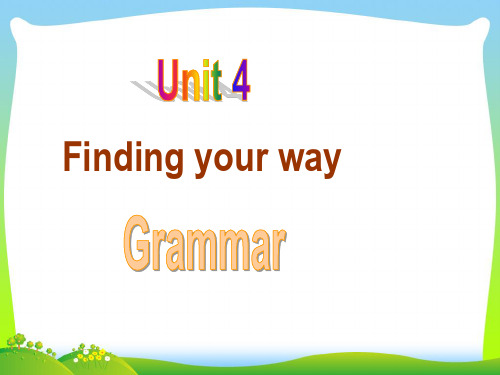
② 表示“每一” I go to the cinema once a month. We have five English lessons a week.
③ 指某人某物,但并不具体指哪个人 或哪个物 A reporter tells us the fact. Lend me a storybook.
Finding your way
cage across inside outside above below
sign over bench
Words review
n. 笼子,鸟笼 prep. 在…对面;穿过,横过 prep. 在…里面 prep. 在…外面 prep. 在…上面 prep. 在…下面 n. 指示牌 prep. 在…上面 n. 长椅
不定冠词的使用
不定冠词用在名词前指第一次提到的某 人或某物,不定冠词具有“某一个”的
意 思,但并不强调数量,如第一次提到的 a baseball。当再次提到这个人或物时应 该用定冠词,表示特指第一次提到的那 个人或物。如:
① - I have a new book. 我有一本新书。
- Can I look at the new book? 我可以看看那本新书吗? (the new book是指第一次提到的
4. How often do you go on _a_ picnic? 5. How about _th_e_ Monkey King? 6. I dance for half _a_n_ hour every day. 7. For breakfast, I always have _a_n_ egg. 8. There’s _a_ new mall down _t_h_e street.
— Why do you like Mary?
③ 指某人某物,但并不具体指哪个人 或哪个物 A reporter tells us the fact. Lend me a storybook.
Finding your way
cage across inside outside above below
sign over bench
Words review
n. 笼子,鸟笼 prep. 在…对面;穿过,横过 prep. 在…里面 prep. 在…外面 prep. 在…上面 prep. 在…下面 n. 指示牌 prep. 在…上面 n. 长椅
不定冠词的使用
不定冠词用在名词前指第一次提到的某 人或某物,不定冠词具有“某一个”的
意 思,但并不强调数量,如第一次提到的 a baseball。当再次提到这个人或物时应 该用定冠词,表示特指第一次提到的那 个人或物。如:
① - I have a new book. 我有一本新书。
- Can I look at the new book? 我可以看看那本新书吗? (the new book是指第一次提到的
4. How often do you go on _a_ picnic? 5. How about _th_e_ Monkey King? 6. I dance for half _a_n_ hour every day. 7. For breakfast, I always have _a_n_ egg. 8. There’s _a_ new mall down _t_h_e street.
— Why do you like Mary?
牛津译林版英语七年级下册Unit 4 Grammar 课件
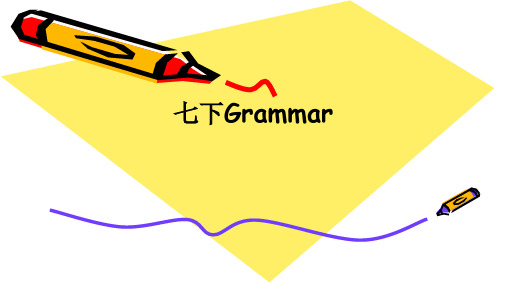
ears.The ears are like open fans.
结论:a用于辅音音素开头的词前,an用于元音音素 开头的词前。
Have a try
__a_ lion [ˈlaɪən] _a_n_orange [ˈɒrɪndʒ] _a__giraffe [dʒəˈrɑːf] _a_n_umbrella [ʌmˈbrelə]
It is _a_ monkey.
_T_h_e__ monkey is eating an apple
A&an
We can see __a_ giraffe and _a_n_ elephant.The
[dʒəˈrɑːf]
[ˈelɪfənt]
giraffe has a long neck.The elephant has large
七下Grammar
Using a ,an and the
What can you see in the zoo?
articles(冠词)
I can see a monkey,a giraffe,a lion,an elephant and so on in the zoo.
It is _a_g_i_ra_f_f_e_ . The giraffe has a long neck.
zoo now!Giraffes are the tallest animals in the world.Their
long necks can help the固m定e短a语t leaves from trees.In the世界上独一无二的事物
afternoon,they will go shopping.They will go to the
below under
牛津译林英语 七年级上册unit4 Grammar课件

从各题后所给的A、B、C和D四个 选项中选出最佳答案。
1. I like playing tennis ___ the afternoon, but
I will play basketball ___ this afternoon.
A. in, /
B. in, in
C. in, on
D. in, at
we use ‘in’ before _p_a_r_ts__o_f_th__e_d_a_y_, _m_o_n_t_h_s_, _s_ea_s_o_n_s_, _y_e_a_rs_.
When do we use 'on'?
Bob does not go to school on Saturday. Bob's summer holiday starts on 1 July. Bob goes swimming on Sunday morning. Bob has lots of fun on Children's Day.
him. After breakfast, he goes to school. He and his
parents go on a trip to Hainan _i_n_ February every year. In Hainan, it never snows _i_n_ winter. They will go to watch the 22nd World Cup _i_n_ 2022.
do not have lessons _o_n__ Saturday or
Sunday.
Help Tommy complete his email with the correct prepositions of time.
牛津译林版7A Unit4 Grammar (共31张PPT)
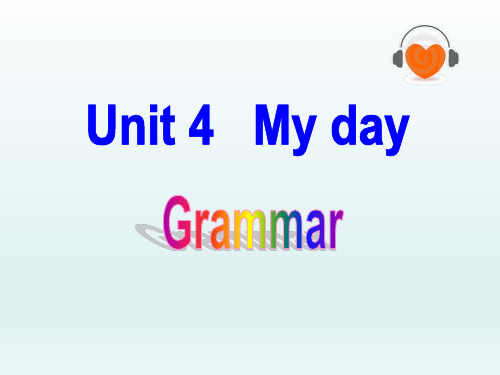
We do not have lessons _o_n__ Saturday or Sunday.
I love sports. I am good at playing football. I often play it with my friends _o_n__ Saturday afternoon. We have a school football match __in__ autumn every year. This year, it is __o_n_ 15 November. My friends and I always have great fun then.
Free Talk
What time do you get up every day?
I get up at 6 a.m. What day do we have the class
meeting?
On Monday.
When do you usually swim with your friend?
on 7 October on Monday
3 具_体_某__日__的__早__中_晚_ 前 on the morning of
4 有__d_a_y_的__节__日__前_
on
May 10 May Day
Prepositions of time 时间介词
1. parts of day 2. months 3. seasons 4. years
1. My parents watch TV in the evening. 2. We plant trees in March every year. 3. In Hainan, it never snows in winter. 4. The 22nd World Cup is in 2022.
2019牛津译林版7A Unit4 Grammar (共31张PPT)教育精品.ppt
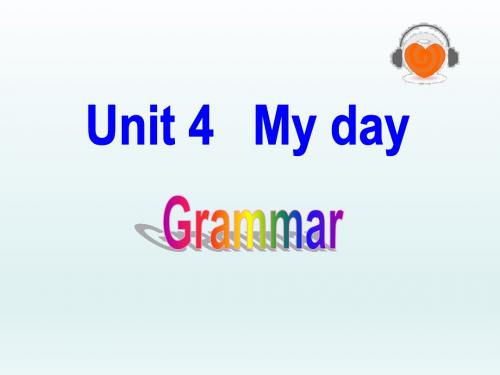
May Day . 4. He often takes Eddie for a walk __i_n__
the evening. 5. They have a long holiday ___in___
November.
用正确的介词填空
• 1. I often get up at half past six .
1. My parents watch TV in the evening. 2. We plant trees in March every year. 3. In Hainan, it never snows in winter. 4. The 22nd World Cup is in 2022.
All the best,
Tommy
Adverbs of
frequency
100%
dance go
swimming
80%
play
go
football
60%
play
skating
always usually
40%
play
badminton
20%basketball
often
sometimes
0%
seldom
Christmas . 3. She starts learning English __a_t__
six o’clock. 4. It’s cold ___i_n___ winter in China. 5. They play the game _____o_n__ the
evening of 31st October.
用正确的介词填空
• 1. My daughter was born on July 12 th,1995.
the evening. 5. They have a long holiday ___in___
November.
用正确的介词填空
• 1. I often get up at half past six .
1. My parents watch TV in the evening. 2. We plant trees in March every year. 3. In Hainan, it never snows in winter. 4. The 22nd World Cup is in 2022.
All the best,
Tommy
Adverbs of
frequency
100%
dance go
swimming
80%
play
go
football
60%
play
skating
always usually
40%
play
badminton
20%basketball
often
sometimes
0%
seldom
Christmas . 3. She starts learning English __a_t__
six o’clock. 4. It’s cold ___i_n___ winter in China. 5. They play the game _____o_n__ the
evening of 31st October.
用正确的介词填空
• 1. My daughter was born on July 12 th,1995.
牛津译林版7A Unit4 My day Grammar课件(共20张PPT)
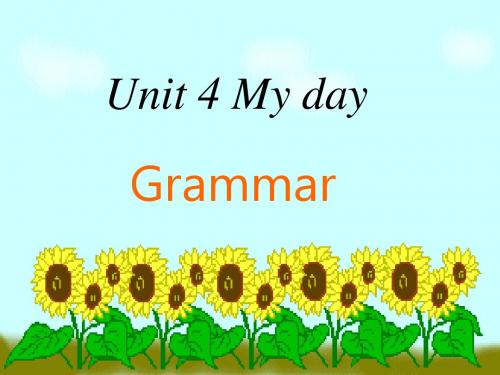
• • • • • • • • • • • •
7.每周一早上我们都会开校会。 on Monday _______. morning Wehave a school meeting _____ 8.她四岁的时候就会跳舞了。 She could dance _____ at the age of 4. 9.我们的第一节课开始于8点整。 at 8:00 o'clock. Our first lesson starts ___ 10.他在一个寒冷的早上离开了家。 He left(/e/) home ____ on a cold morning. 11.我们喜欢在午饭的时候看新闻。 We like watching news _____ at lunchtime. 12.我们周日没有课。 We have no lessons ______ on Sunday.
Free talk Prepositions of time 时间介词
I go to school at 6:20 in the morning. We have English lessons on Mondays. We have Chinese lessons in the morning. We do our homework in the evening.
时间介词"on"的用法
• lie has breakfast at seven o'clock.
at:在几点
• 2.Children in China start school at 6 years old. at:在几岁 • 3.My father reads newspapers at breakfast. at:一日三餐 • 4.They go shopping at Christmas. • 5.We visit friends at Spring Festival.
牛津英语译林版7A Unit4 Grammar (共41张PPT)

morning and two _____ in the afternoon. We do not have lessons ____ on Saturday or Sunday. I love sports. I am good at playing football. I often play it with my friends ____ on Saturday afternoon. We have a school football match ____ in autumn every year. This year, it is ____ on 15 November. My friends and I always have great fun then. All the best, Tommy
表示否定
4. sometimes 、often 、usually 、always 表示肯定
5. 对频率副词和表示频率的时间
划线提问用:
How often “多久(一次)”
6. 频率副词在句中的位置:
“Be后 ”、“行前” “助行间”
频率副词在句中的位置: 1. 频率副词用在be动词后。 2. 频率副词用在行为动词前。 3. 频率副词用在助动词与行为动词之间。
Ready? Go!
I. 单项选择 1. The meeting is _____ the morning. A. in B. on C. at D. from 2. He started learning French __ 15th May. A. to B. for C. at D. on 3. I don’t like skiing at all. I _____ go skiing. A. never B. seldom C. often D. sometimes
牛津译林版7A unit4 grammar (共34张PPT)
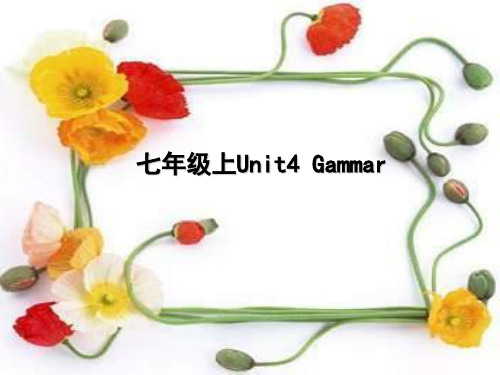
七年级上Unit4 Gammar
Prepositions of time表示时间的介词 /prepə'zɪʃ(ə)n/
in
on
at
11 12 1
10
2
9
3
8
Байду номын сангаас
4
76 5
They do morning exercises at 8 o’clock.
Children’s Day is on June 1st.
100% 80% 60% 40% 20% 0%
never seldom sometimes often usuallyalways
Adverbs of frequency
swim
dance
play
go roller skating
badminton play basketball
play football
will play basketball _____ this afternoon.
11. The boy gets homoen__ a cold winter morning.
12. We have a party ___ New Year’s Day.
Adverbs of frequency
__p_a_r_ts__o_f _a_s_p_e_c_if_i_c_(特__定__的__) _d_a_y__, __sp__ec_i_a_l(_特__殊__的__)_h_o_l_id__a_y_s __. (on 用于表示具体的日子,日期;特指某天的各个部分;
一些特殊的节日)
1. We have a PE lesson ___o_n___ Friday.
Tommy and Millie often chat with each other on the
Prepositions of time表示时间的介词 /prepə'zɪʃ(ə)n/
in
on
at
11 12 1
10
2
9
3
8
Байду номын сангаас
4
76 5
They do morning exercises at 8 o’clock.
Children’s Day is on June 1st.
100% 80% 60% 40% 20% 0%
never seldom sometimes often usuallyalways
Adverbs of frequency
swim
dance
play
go roller skating
badminton play basketball
play football
will play basketball _____ this afternoon.
11. The boy gets homoen__ a cold winter morning.
12. We have a party ___ New Year’s Day.
Adverbs of frequency
__p_a_r_ts__o_f _a_s_p_e_c_if_i_c_(特__定__的__) _d_a_y__, __sp__ec_i_a_l(_特__殊__的__)_h_o_l_id__a_y_s __. (on 用于表示具体的日子,日期;特指某天的各个部分;
一些特殊的节日)
1. We have a PE lesson ___o_n___ Friday.
Tommy and Millie often chat with each other on the
2019精选教育牛津译林版7A Unit 4 My daygrammar (共30张PPT).ppt
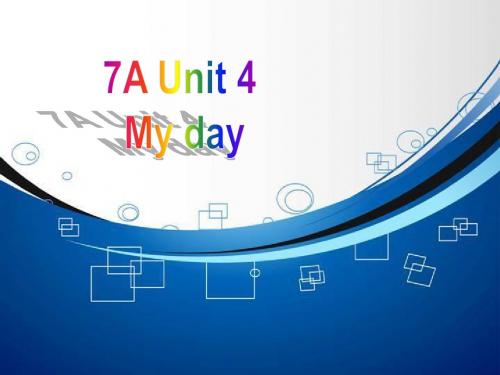
We do not have lessons _o_n_ Saturday or Sunday. I love sports. I am good at playing football. I often play it with my friends _o_n_ Saturday afternoon. We have a school football match _i_n_ autumn every year. This year, it is __o_n 15 November. My friends and I always have great fun then. All the best, Tommy
______ watches TV on weekdays.
A. often
B. always
C. usually
D. never
3. Amy plays sports every day and she
________ healthy.
A. always is
B. is always
C. never is
6. I am never late for school. 从不
Look and fill in the blanks.
SMADKiamainiltnldotyiiyenye_l_l_i_k__e__s__dgs_oawpenplisacmlyairnsoysglsabfl.oefSatorohdeotsrembtkbsa_iacnal_tlhlt_ilano_.fnogdtl.ea.Srnhscceeh’ssoanofolt.etrvery gscohoodoal.t it.
weekend. 8. It is good to go for a walk _o_n a sunny
牛津译林七年级上册Unit4 Grammar (共23张PPT)
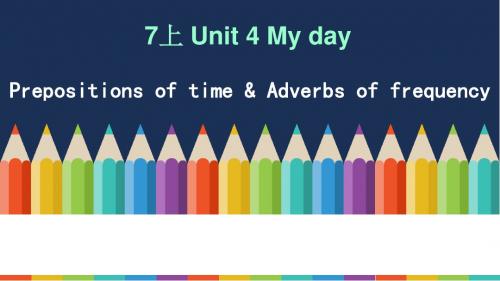
频度副词所表示的频率由低到高为:
never seldom 从不 很少
0%
sometimes 有时
often 经常
usually 通常
always 总是
100%
Task 6
Practice: read and complete
Monday
dance
Tuesday music
Wednesday
dance
fun then.
All the best,
Tommy
课堂互动探究
[探究] (1)would like to do sth意为“_想_要__/_愿__意_做某事”。would like to do sth 的一般疑问句形式表示向别人委婉地提出请求或__建__议____,其肯定回答为 “Yes, I'd like/love to.”,否定回答为“I'd like/love to, but…”。
Make an interview
Questions: 1.When is your birthday? On 1 January/… 2.What season is it in? In spring/summer…
3.When do you eat a birthday cake? 4.When do you start learning On my birthday. English(开始学英语)? In Grade 3.
school.
久一次”
4. Daniel does not like basketball. He never plays it.
5. Kitty goes to her dancing lessons every day. She always dances for half an hour. 6. Millie sometimes goes roller skating, but she is not good at it.
牛津英语译林版7A Unit4 Grammar (共41张PPT)
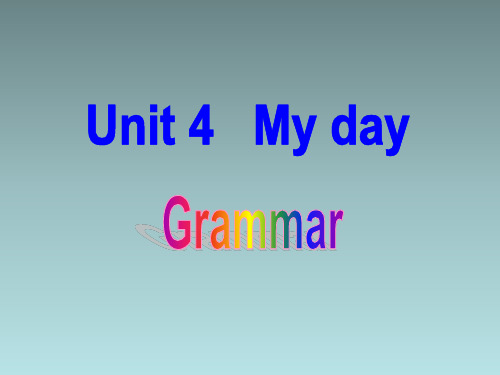
•
10、阅读一切好书如同和过去最杰出 的人谈 话。2021/8/142021/8/142021/8/148/14/2021 12:46:33 AM
•
11、一个好的教师,是一个懂得心理 学和教 育学的 人。2021/8/142021/8/142021/8/14Aug-2114- Aug-21
•
12、要记住,你不仅是教课的教师, 也是学 生的教 育者, 生活的 导师和 道德的 引路人 。2021/8/142021/8/142021/8/14Satur day, August 14, 2021
summer
autumn
winter
时间介词
我们谈论时间时, 何时用at / in /on ?
时间介词
at: 用在: 1. _钟__点__时_ 间前 2. _三__餐__时__间前
at 6:00am at supper
3 _具__体__年__龄__前_______ at 8 years old
• 4、All that you do, do with your might; things done by halves are never done right. ----R.H. Stoddard, American poet做一切事都应尽力而为,半途而废永远不行6.17.20216.17.202110:5110:5110:51:1910:51:19
3)in • 1. 在一天早中晚前 • 2. 在月份前 • 3. 在年份前 • 4. 在季节前
1) at • at six o’clock • at breakfast • at Christmas • at 8 years old
2)on • on Monday • on 15th July • on the morning of May 5 • on May Day
相关主题
- 1、下载文档前请自行甄别文档内容的完整性,平台不提供额外的编辑、内容补充、找答案等附加服务。
- 2、"仅部分预览"的文档,不可在线预览部分如存在完整性等问题,可反馈申请退款(可完整预览的文档不适用该条件!)。
- 3、如文档侵犯您的权益,请联系客服反馈,我们会尽快为您处理(人工客服工作时间:9:00-18:30)。
at
We use ‘at’ before:___t_im__e_o_f _da_y_, ___a_g_eand __s_om__e_fe_s_ti_va_l_s ____.
(at 用于表示某一时刻、年龄、三餐饭 及特定的节日。)
Fill in the blanks with in, on or at where necessary.
every year.
Tommy’s school life
Dear Millie, Thanks for your e-mail. I would like to tell you about my life here. Our lessons begin___a_t_ nine o’clock. Usually we have three lessons __in__ the morning and two __i_n__ the afternoon. We do not have lessons __o_n_ Saturday or Sunday. I love sports. I am good at playing football. I often play it with my friends __o_n_Saturday afternoon. We have a school football match__in__ autumn every year. This year, it is __o__n15 November. My friends and I always have great fun then. All the best, Tommy
5. They have a long holiday__i_n___ November. 6. He was born ____in____ 1992. 7. He likes reading newspapers__a__t___ breakfast. 8. It’s cold __i_n____ winter in China. 9.They play the game___o_n____ the evening of 31st October.
Unit 4 My day
• 学习目标 • 1用正确的介词来表达时间。 • 2.正确识别并使用频度副词。
• 自学反馈
• 20.He is often late for school, I don’t know what
• his_r_e_a_so_n_(原因) is.=I don’t know why. • 21.I w__is_h___(祝愿) you have _g_o_o_d_l_u_ck_(好运).
• o_n_c_e____(一次) or__tw_i_c_e__(两次) a month.
• 25.How often do you go on a p_i_c_n_ic__(野餐)?
• Once a week.
• 26.The new year is coming ,people are getting • ready f_or___it. • 27.All the runners are getting reading_t_o_r_u_n_ • (run) at the starting line(起跑线上).
• polite to people.
•
Part A: Prepositions of time
I go to school at seven o’clock. We have our history lessons on Monday. We have Chinese lessons in the morning. We do our homework in the evening. We have no classes on Sunday.
• 28.--Are you all ready?
• --Yes, we get ev__e_ry_t_h_in__g___ready . • 29.We _l_e_a_rn__a__lo_t_____(学了很多) from
• teachers.
• 30.The children should learn_t_o__b_e___(be)
13. I don’t have a party ____ this week.
14. We’ll have a party ____ next week.
15. The story happened __o_n__ a cold winter morning. 16. My friends give me some presents __a_t__ Christmas
1. We don’t go to school__o__n___ Sunday.
2. My birthday is __o__n___ April 1st. 3. We’re going to see the doctor___a__t__ four o’clock. 4. He often takes Eddie for a walk __i_n__ the evening.
10. He got home _o_n___ the morning of the 4th last month. 11. My father usually goes fishing _a__t_ the weekend. 12. It is a good idea to go for a walk _o_n__ a sunny morning.
• 22.I_w_i_s_h___(希望) you have a good time at the
• weekend.
roller skating
• lie seldom goes _______(溜旱冰),but she
• is not good at it. • 24.We go to visit the Science__M_u_s_e_u_m(博物馆)
…
in
We use ‘in’ before _p_a_rt_s_o_f _th_e_d_a_y____, _m_o_n_th_s__, _s_ea_s_on_s__and _y_ea_r_s__.
(in用于表示上午,下午和晚上,月份,季 节或者年。)
on
We use ‘on’ before:_d_a_ys__, _d_a_te_s_, _pa_r_ts_o_f_a_s_p_e_ci_fi_c_d_aay nd __sp_e_c_ia_l _h_ol_id_a_y_s__. (on 用于表示星期、某一天、某天的 早中晚及特定的节日。)
